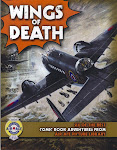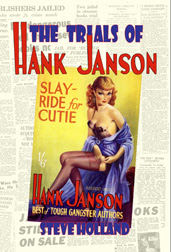The Dundee Courier (12 May 1928) said of it:
Arthur Salcroft's novel, The Mystery of the Walled Garden (Hutchinson, 7s 6d), is a detective story out of the usual run. The author does not present the reader with a murder to arouse the interest, but a mystery to solve which is as baffling as the inevitable murder which ultimately takes place. The key to the mystery lies within a "walled garden" and although Allandale, a rising young barrister, is prevented from investigating it, he becomes personally involved. Cupid then steps in and brings happiness to Allandale and Mrs. Radalin, a charming widow, thus providing a satisfactory ending to a delightful mystery tale."Suspicion in connection with a murder falls right and left, and as usual the reader is soon lost in a maze of possibilities," said the Aberdeen Journal (19 April 1928). "Relief from theorising is afforded, however, by the presence of a fascinating widow whose charms are far from being lost on the young barrister who is investigating the murder."
Salcroft's second novel appeared in February 1929 and was reviewed by the Dundee Courier (15 February 1929) thus:
The opening pages of The Twisted Grin by Arthur Salcroft (Hutchinson, 7s. 6d) promise tense excitement and the promise is fulfilled. The story concerns the adventures, and incidentally the love story, of a young doctor who is implicated in a search to recover a mysterious death ray apparatus that has fallen into unscrupulous hands. if at times the narrative flags a little, the mystery and the numerous exciting episodes make a story that can confidently lay claim to be a real "thriller".Salcroft's third novel was more of an action-adventure concerting John Traile, a young and adventurous London solicitor, who, while holiday-making in Devonshire, discovers a gang of modern-day smugglers at work. For the love of a lady, John allows himself to be drawn into the smugglers' organisation, and takes his part in rum-running and other less reputable schemes.
Arthur Edward Beecroft was born in Hastings, Sussex, on 12 June 1887, the third child of Edward Robert Beecroft, a warehouseman, and his wife Alice Mary Beecroft (nee Cook). Edward grew up in Tunbridge Wells and lived with his parents throughout his education at Tunbridge, The Leys and Cambridge. He trained as a barrister, passing in Criminal Law and Procedure in his exams at the Inns of Court in November 1911 and passing his final exams in June 1912.
Beecroft's war service is related in Gallipoli: A Soldier's Story, published in 2015 by Robert Hale, who have written the following about the book:
At the start of the First World War, Arthur Beecroft was a recently qualified barrister in his twenties. Determined to enlist despite a medical condition, he volunteered for military service, first as a regular soldier, then as a despatch rider. Offered a commission in the Royal Engineers, in 1915 he saw action at Gallipoli. Now a byword for catastrophic military disaster, the Gallipoli Campaign was the ill-conceived Allied invasion of the Dardanelles. The campaign stalled almost immediately, resulting in over half a million casualties on both sides. Lucky to survive, several years later Beecroft wrote a detailed memoir of his experiences. Discovered by his granddaughter and now reproduced here almost exactly as it was written nearly a century ago, Beecroft's vivid narrative takes us through those heady days of the declaration of war, enlistment, initial training, the bungled landing at Suvla Bay, and the exceptionally difficult conditions of the Gallipoli terrain. This is no mere jingoistic account. With a keen eye, Beecroft brings to life the men dogged by disease and exhaustion - ordinary soldiers who, even as they suffered the betrayal of incompetent leadership, displayed extraordinary reserves of heroism and bravery. Throughout this rare insight into what it was like for an ordinary 'civilian soldier' swept up in the fog of war, Beecroft's authentic voice still speaks honestly to us today - of comradeship and devotion to duty, of fear and facing death. Now published for the first time in the centenary year of the Gallipoli Campaign, this is a soldier's story in his own words.Beecroft enlisted in 1914 and served as a Signals Officer during the Gallipoli campaign. After the war he was awarded an MBE in 1922.
In her introduction to Gallipoli, Beecroft's granddaughter, Prue Sutton, notes:
My grandfather was a colourful character in many ways. As a young man he travelled across the United States in a stagecoach and also explored parts of South America. After losing an eye from infection, he would often wear a monocle, which made him quite scary to us grandchildren! He was highly principled and expected one to do one's best at all times; he sometimes had a short temper and didn't suffer fools gladly. He was a fearsome adversary as a barrister in Court. Between cases he would sit at his typewriter in his chambers and write detective novels and plays.Why "Arthur Salcroft" stopped writing is unknown. Certainly Arthur Beecroft became involved in the discussion about simplifying litigation, saying that procedures needed to made less technical and less expensive and that delays to trials in some courts "almost amounts to a denial of justice."
Beecroft was married to Beryl Constance Salt in 1919 and had two children, Pamela, born in 1920 (who married Squadron Leader Douglas Hamilton Grice in 1941), and Robert C. born in 1922. Both Mr and Mrs Beecroft were involved in active service during the Second World War, Arthur Beecroft serving in the Home Guard, and Beryl Beecroft as a Squadron Officer with the W.A.A.F., for which she received an OBE.
"He was a passionate gardener and later in life he loved to paint rural scenes in and around Buckinghamshire where he lived most of his life," recalls Prue Sutton. Arthur Beecroft died peacefully in a nursing home at Gerrards Cross on 12 March 1974 and is buried at Chilterns Crematorium.

























































No comments:
Post a Comment